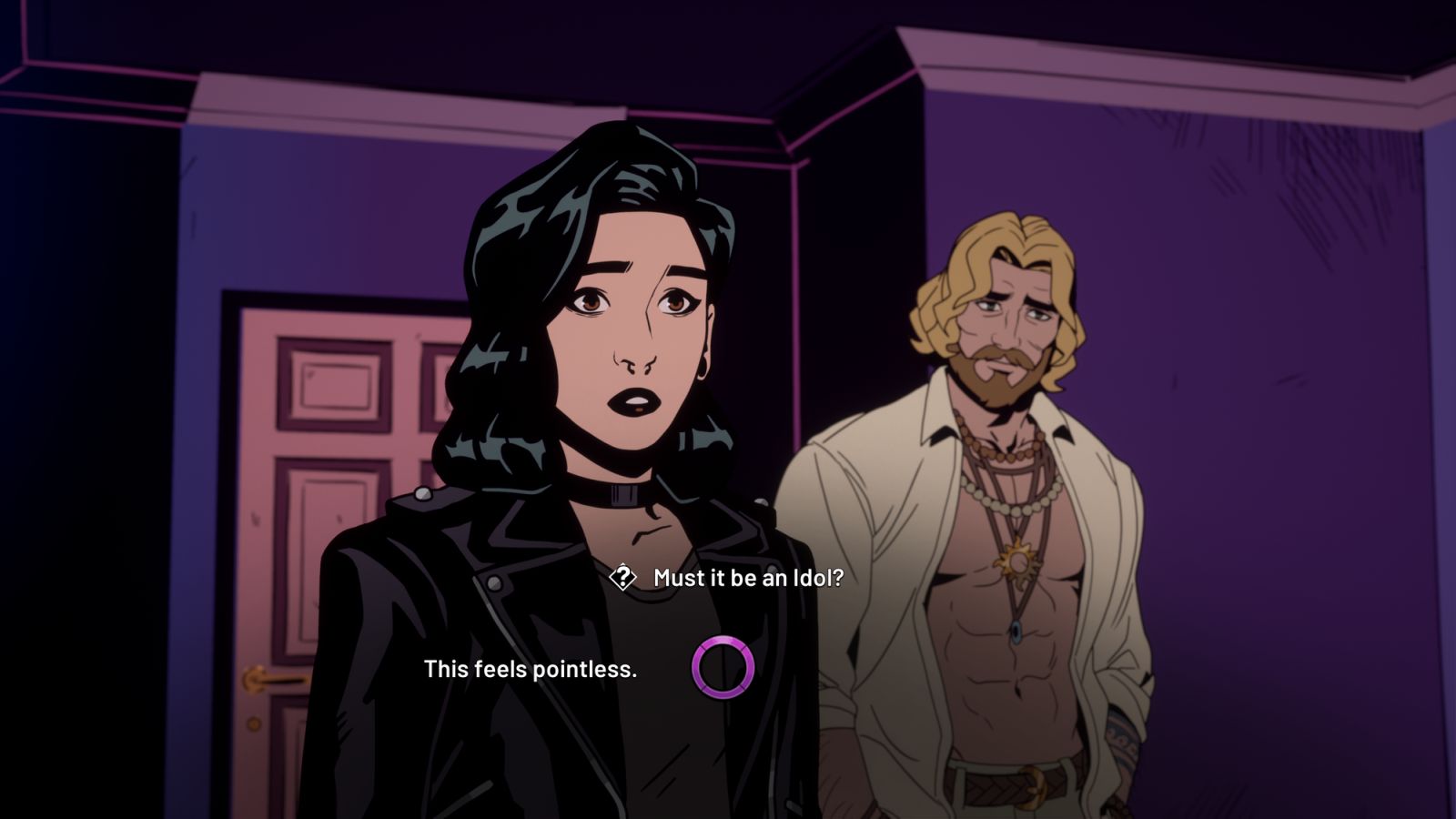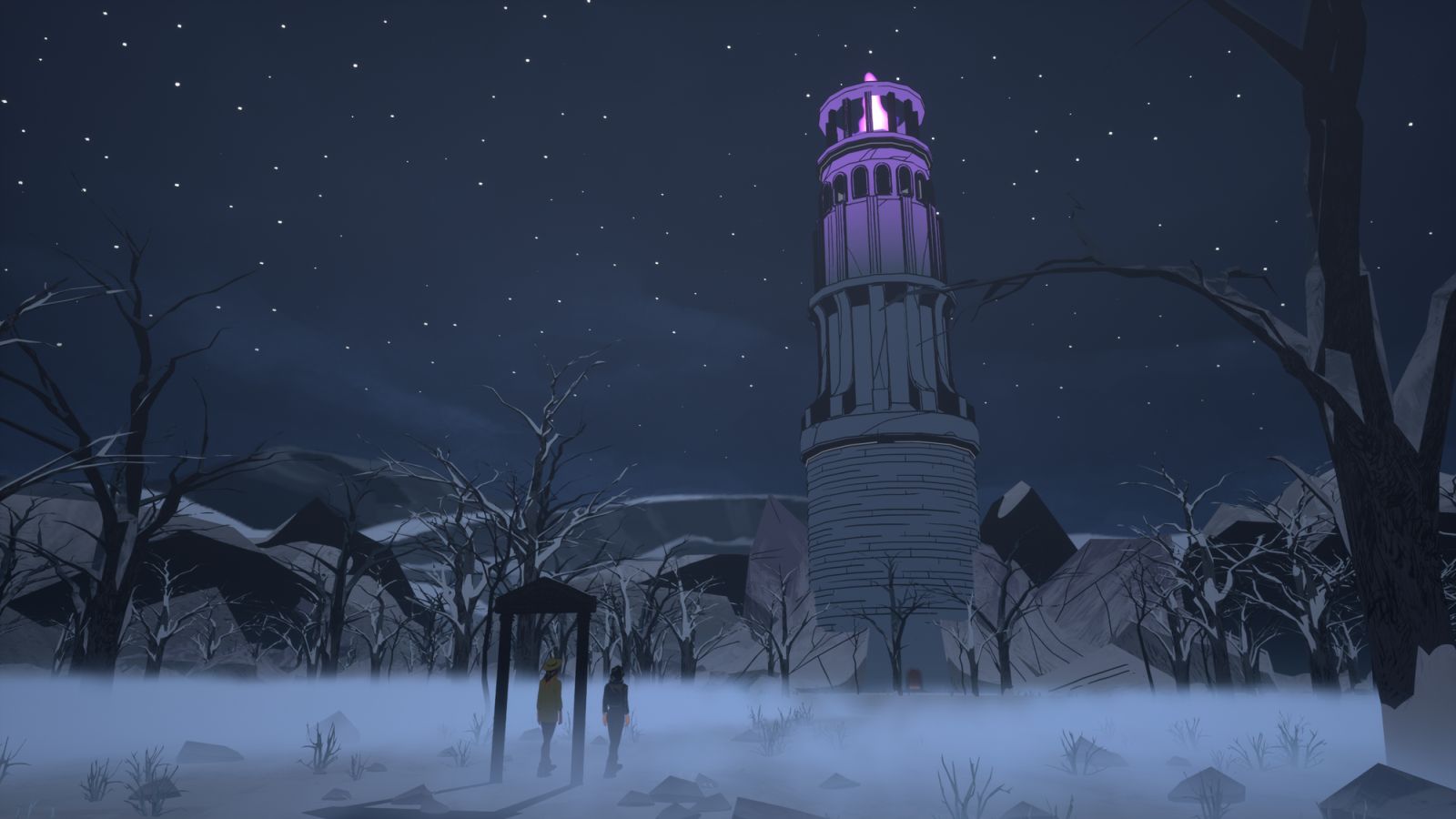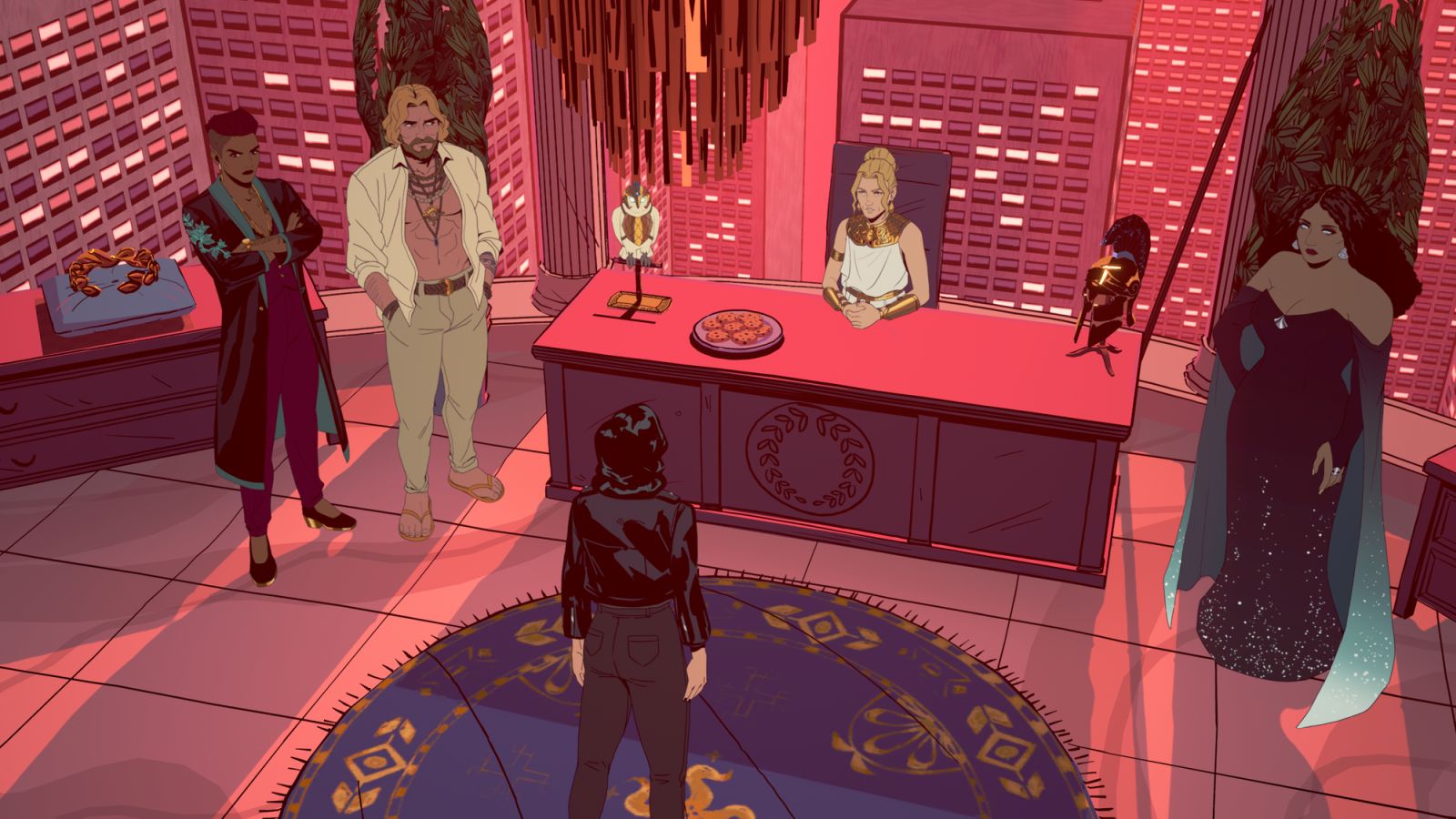My favorite thing about video games is that they are a constantly evolving art form. Since their inception, developers have experimented with unique ways to tell stories, often pushing the so-called boundaries of what constitutes a video game in the process. All this experimenting has led to a game like Stray Gods existing, a game which is essentially alone in a genre of its own creation, while also feeling familiar. It is at once a game, a musical, and a concept for what could come to be. While Stray Gods ultimately succeeds at what it set out to do and provides a unique, if a bit too uneven of an experience. Individual player mileage will vary wildly depending on the type of interactivity players expect from their gameplay experiences.
Stray Gods begins with Grace, the lead singer of a band in desperate need of a breath of fresh air, holding auditions for new members. With no good prospects found, the rest of her band heads home disappointed, leaving Grace alone. Grace begins doing what all sad characters in musicals do – sing. In walks a late auditioner, named Calliope, who proceeds to turn Grace’s song into a duet. Impressed with the performance and the vulnerability shown by Calliope, Grace offers her a position in the band, but Calliope declines, instead leaving just as mysteriously as she had come. That night, Grace hears a knock at her door and answers only to find a dying Calliope, who passes her eidolon on to Grace. Before Grace can comprehend what has happened, Hermes immediately shows up and escorts her to face The Chorus, a group of Idols consisting of Athena, Apollo, Aphrodite, and Persephone who must now determine Grace’s fate.
Turns out, Calliope was an Idol. More specifically, she was a muse who had helped inspire some of the greatest artists of all time. Seeing as how Gods are notoriously hard to kill and how Calliope had never mentioned Grace before, The Chorus is understandably wary and assumes that Grace had a hand in Calliope’s death in hopes of becoming an Idol. With no evidence to prove Grace’s innocence, Athena decides that Grace must be sentenced to death. Before the judgment is made official Apollo objects, leading Grace to be granted a week to prove her innocence. Thus, Grace sets out with her newfound muse abilities to uncover the mystery behind Calliope’s murder and to save herself from death.
The premise is interesting enough and serves as an exciting jumping off point for what I believe is the first full-fledged interactive musical video game. I know musical numbers are no stranger to video games, with a few games having included one or two along the way, but a game with the entire premise based around an interactive musical in which you help shape the songs and narrative as you progress is, I believe, an entirely original experience.

Early in the game, you are given a chance to decide Grace’s defining personality type: charming, kickass, or clever, each of which will unlock or lock dialogue options as you progress. This creates a few scenarios where I was frustrated by the choices I could and couldn’t make, but also serves as a great reason to replay the story at least once, if not two more times, just to hear the different song lyrics and experience the different narrative outcomes of your choices. That said, Stray Gods is more of a movie musical than a game, so that may limit replayability for some.
What little interactivity you have in Stray Gods boils down to dialogue choices, of which there can be up to four. Additionally, you can choose items to look at, individuals to speak with, or where to go next from a map. Essentially, everything is predetermined, you just choose the order to accomplish tasks. You are never given the freedom to strike out on your own or do anything the game doesn’t have scripted for you to do.
Dialogue choices come during conversations and songs, allowing Grace to control the outcomes of important moments and who she lets into her inner circle. While speaking with others you can take time to make your choices carefully, but during songs you are often pushed to make a choice in the moment, unsure if it will lead to those you are confronting to help you or push you away. Dialogue choices in gaming are nothing new, but being allowed to flesh out a song that is actively being sung is an entirely new experience and quite enthralling.

I had a great time watching my choices unfold in song form and seeing how they impacted the storyline, and I can’t help but wonder what songs or events may have occurred had I made different choices. I suppose that is a great excuse for a replay.
The songs are the focal point of Stray Gods and rightly so. Through these songs Grace comes to realize that the Idols are not much different from mortals. They have addictions, pain, fear, and longings – albeit on a much greater scale as immortality forces them to live with these issues for far longer than anybody should. Through these songs Grace gets to see the inner thoughts of these troubled souls and learn their past. The songs are a highlight of the game, with many being hauntingly beautiful, often exposing an aching tale of heartbreak and regret. This is especially true when you play Grace as a kind and compassionate soul, rather than someone aggressive or mean-spirited, which allows the Gods to be more vulnerable around her. Other songs span the gamut of musical genres, often juggling multiple styles in true musical theater fashion and offering a bit of something for all musical preferences.
What surprised me was how funny, and fourth wall breaking, the game could be. There is a ridiculous song involving a love-struck Minotaur, and the game isn’t afraid to allow the characters to show bewilderment at their urge to sing and dance despite themselves. The moments of levity help in what is a rather dark story, mainly due to the backstories of those you encounter rather than the main plot itself.

Stray Gods boasts a talented cast of stars from both TV and theater fame, leading to relatively great performances and acting all around. A few song moments flounder, but overall, I was impressed by the songs and their composition. It is no small feat to tell a story through song, with many composers spending years creating a musical, so to do so in video game form is an impressive accomplishment.
The game plays out mainly through still images, though they are colorful and detailed. You have no control over grace physically, and nobody fully walks, speaks, or sings with full animation. At first, this is a bit disconcerting, but you eventually accept the art style. I can’t help but wonder how much the game would have benefited from going fully animated or allowing the player a bit more freedom to explore, even if only in condensed areas.

While interesting, the story of Stray Gods is not quite in-depth enough to sustain the game’s 5-to-7-hour campaign. The game has a habit of indulging in side-stories a bit too often, considering the main character is knocking at death’s door, even if many of those side stories are quite entertaining. The story deals with many heavy themes, though never quite settles on a mood. One moment the characters may be talking about death, pain, or even suicide, and then the next they are flirting. Some of this may stem from your ability to make dialogue choices, but the game has a weird flow that at times distracted me. I feel as if a more condensed story of 2.5 to 3 hours, the length of a basic musical theater piece, would have benefited the story more.
Stray Gods also has a variety of issues, depending on the console you are playing on. On PS5, I mainly encountered sound issues, with the volume ranging from normal to shatter-your-ear-drums regularly. On Nintendo Switch, my co-reviewer, David, experienced much more game-breaking issues which I’ll allow him to explain in his portion of this review.
David’s Thoughts:
I was pretty excited leading up to Stray Gods’ release, but found myself very disappointed with various aspects of the game, in particular, the Switch version. I figured this platform would be a perfect fit, letting me run through a song or two portably. While you can do exactly that, the game looks horrendous in both docked and portable mode. I assume they had to downgrade the resolution drastically because Unreal Engine doesn’t play terribly nice with the Switch. The 2D art always looks either fuzzy and out of focus or incredibly jagged, almost like pixel art. The backgrounds are nice and colorful, benefiting from being low detail, but some locations, like the outside of the Reliquary, look like placeholder assets.
I also encountered constant audio issues. For example, in one scene where Grace and Persephone are talking, Grace’s voice is very loud while Persephone is barely audible, requiring me to constantly adjust the volume. This issue persists in just about every scene for every character. It makes the title genuinely hard to want to play. This issue is apparently also on PS5, but not quite as exaggerated.
While I found the story and characters interesting, the central murder mystery isn’t paced very well. You barely get any clues, or clues that don’t feel like they matter much, for hours at a time.
Ideally the songs would keep you going, but only two really stood out to me: Adrift (the first song) and The Ritual (Aphrodite’s song). Both of these songs are perfect examples of what I love about musicals. For Adrift, when Grace lacks the words for her feelings she begins to express it in song; it’s a fantastic introduction to her character and shows you what she wants. Meanwhile, The Ritual essentially serves as an argument between Grace and Aphrodite, with their two distinct styles clashing and then coming together in both music and lyrics. It works great as a game too, because your choice here will determine the outcome of a very high stakes moment. These moments are what I wanted out of Stray Gods, and while the game is overall good, I wanted to see more of things like this.

















